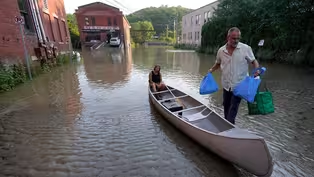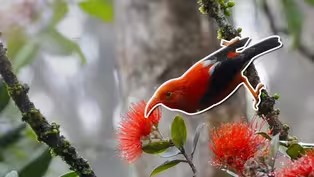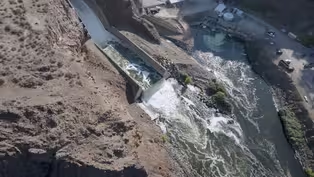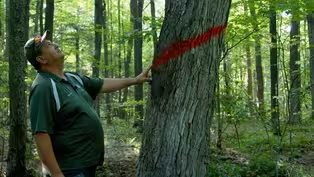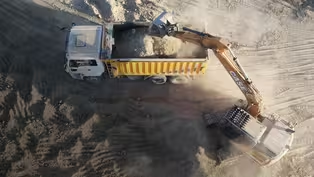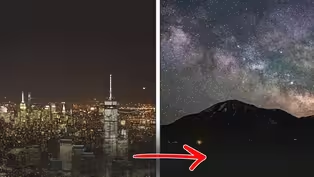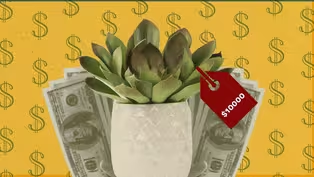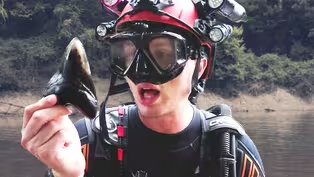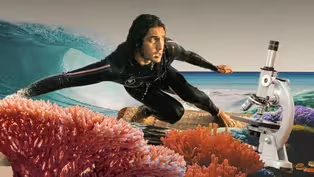
Understory | Meet the Suburban Deer Hunters of Long Island
Special | 8m 35sVideo has Closed Captions
Baratunde meets a female suburban bowhunter to discuss how the sport is changing.
Baratunde Thurston meets Jacqueline Molina, a member of a new group of hunters embracing the sport. Her weapon of choice is a bow & arrow, and while some of the reasons why she hunts are rooted in tradition, others are related to conservation. Deer overpopulation is a big problem in Long Island, NY, and hunting is the primary - but also the most controversial - method of managing deer populations.
Problems playing video? | Closed Captioning Feedback
Problems playing video? | Closed Captioning Feedback
Major support is provided by Anne Ray Foundation, a Margaret A. Cargill Philanthropy and the Richard King Mellon Foundation. Support is also provided by John and Ruth Huss, Susan and...

Understory | Meet the Suburban Deer Hunters of Long Island
Special | 8m 35sVideo has Closed Captions
Baratunde Thurston meets Jacqueline Molina, a member of a new group of hunters embracing the sport. Her weapon of choice is a bow & arrow, and while some of the reasons why she hunts are rooted in tradition, others are related to conservation. Deer overpopulation is a big problem in Long Island, NY, and hunting is the primary - but also the most controversial - method of managing deer populations.
Problems playing video? | Closed Captioning Feedback
How to Watch America Outdoors with Baratunde Thurston
America Outdoors with Baratunde Thurston is available to stream on pbs.org and the free PBS App, available on iPhone, Apple TV, Android TV, Android smartphones, Amazon Fire TV, Amazon Fire Tablet, Roku, Samsung Smart TV, and Vizio.
Buy Now
Providing Support for PBS.org
Learn Moreabout PBS online sponsorshipMore from This Collection
How does our country’s diverse landscape shape our experience of the outdoors? That’s the central question behind the new PBS digital series, America Outdoors: Understory. Join host, Baratunde Thurston, as he explores the unexpected places and ways Americans encounter nature, and how their time outside is impacted by climate change, equity, access, outdoor culture and more.
Understory | Climate Change's Effects on Vermont Flooding
Video has Closed Captions
Discover the science behind this summer’s historic and devasting floods in Vermont. (13m)
Understory | How Engineered Mosquitos Could Save Birds
Video has Closed Captions
Discover how bacteria could be the key to stopping mosquito-borne illnesses. (11m 37s)
Understory | Can Dam Demolition Save California's Salmon?
Video has Closed Captions
What happens when you remove dams that changed the Klamath River a hundred years ago? (11m 54s)
Understory | Can Ancient Wisdom Save the Forests?
Video has Closed Captions
Forests are in trouble, but could ancient wisdom be the answer to saving our trees? (11m 54s)
Understory | We’re Running Out of Sand
Video has Closed Captions
Sand may seem unremarkable, but the modern world is built on it and we’re running out. (13m 7s)
Understory | The Movement to Save Our Night Skies
Video has Closed Captions
Explore one small town’s mission to save the night sky and help migrating birds. (12m 59s)
Understory | Rock Climbing's Troubled Route Naming Tradition
Video has Closed Captions
Baratunde meets a rock climber who is working to diversify the sport. (8m 48s)
Understory | How the Houseplant Boom Fueled Plant Poaching
Video has Closed Captions
Baratunde meets a plant parent who is bringing awareness to the issue of plant poaching. (7m 31s)
Understory | The Fossil Hunter Uncovering Florida’s Past
Video has Closed Captions
Baratunde meets a Florida fossil hunter and learns how this hobby contributes to science. (9m 11s)
Understory | The Scientist Surfing to Fight Climate Change
Video has Closed Captions
Baratunde meets a surfer scientist in Hawaii who is trying to protect the corals reefs. (10m 6s)
Providing Support for PBS.org
Learn Moreabout PBS online sponsorship- [Baratunde] What comes to mind when you think of the suburbs?
Is it the white picket fences, minivans, the perfectly pruned lawns?
What about deer hunting?
This is Jacqueline Molina, co-founder of Long Island Babes and Bucks, a group of women who share a love for the outdoors.
She's been hunting deer for over 10 years, here in the backyards of Long Island, New York, home to America's first real suburb, where the deer are as thick as the accents and the population boom is a major bone of contention.
- After I let my arrow fly, I'll probably just, like, stand there for, like, ten seconds.
It's like a dance recital, when everything's executed perfectly, it's empowering and it shows the work that goes into it.
- [Baratunde] Most folks agree the deer have become much more than just a nuisance.
They're also co-related with ticks and the destruction of forests.
And while this may sound counterintuitive to some, responsible hunting can actually keep them in check.
It's a form of conservation to keep nature here in balance.
But is hunting deer in the suburbs an effective way to control their numbers?
Is it even necessary?
And the women who come out here with their bows and their arrows, what are they really looking for?
I'll be real with you.
I associate deer hunting in America with bright orange vests, shotguns, camouflage, and men.
But these days, more women are taking to the scene.
While there's been a decline in the overall number of hunters in the US, from 2000 to 2015, the number of first-time female hunters increased by 32%.
- I'm what you call an adult onset hunter.
(Baratunde laughs) - It's like a disease.
- Yes, yes.
- An addiction.
- I mean, I'm a walking misconception.
(Baratunde laughs) - Yes!
- [Jacqueline] I mean, and I own it.
Like, you know, I wear makeup, my hair's down, I'm wearing pink, you know, my bow is pink.
I got nails on.
- Yeah.
You sound like you enjoy undermining those misconceptions and doing it your way.
- Like, when I have a pink bow, they're like, don't the deer see that?
And I'm like, I don't know, why don't you ask my chest freezer?
- Ooh.
Wow, shots fired.
Literally shots fired.
- Pun intended.
You know, the best sunrises and sunsets I've ever seen in my life are in my treestand and then, you know, once that sunlight hits and you're like ooh, what's gonna come walking through, what am I gonna see?
In Long Island, I can hunt with my bow the entire season.
I can get into the woods four or five times a week.
Definitely it connects myself, it recharges me, you know, it's a form of therapy, just sitting there and just being alone in solitude.
There's hunts where you don't have any activity and then there's hunts where I'll have deer walking right under my stand.
- [Man] What do you think?
- Pretty exciting.
- [Man] She's big too.
She's big.
- What have you learned about deer by hunting them?
- So just learning their patterns, learning where their food source is, learning where they bed down.
Deer, I see them all the time, I see them on my trail cam, I see them driving everywhere.
- [Baratunde] Well, Jacqueline's not wrong.
Long Island does have a booming deer population.
Deer are everywhere.
(glass shatters) (woman screams) But how did the deer population get so out of control?
During the 19th century, deforestation and overhunting decimated over 95% of deer in the country.
New York was no exception.
And by the 20th century, wildlife management shifted their focus to restoring deer populations.
Some might say New York was too successful.
The farmlands and suburban areas of Long Island in particular became prime feeding and breeding grounds for deer, because as long as there's enough vegetation, and there definitely was, deer herds can double in size every few years.
But too many deer, that's a problem.
Not just for humans, but for the entire ecosystem.
- [Jacqueline] It's very normal if ever drive out on the Long Island expressway and see, like, a deer on the side of the road that's dead and most likely was hit by a car.
You know, there's no predators for deer on Long Island aside from a car.
- [Baratunde] Soaring deer populations have led to an increase in car accidents, damage to crops and gardens, and the spread of tick-borne diseases.
They've also altered forests and reduced the biodiversity in the area by allowing invasive plants to outcompete native ones.
- [Jacqueline] So a lot of the properties that I hunt, they're like they're eating all my hostas, they're eating all my plants.
I'm doing a favor for the homeowner and I'm benefiting it by I consume the venison, I use the tails for fishing.
I paint the heads.
As much of the animal that I can use.
- [Baratunde] Do you see this as a role to restore the larger ecosystem?
Is that any part of your motivation for hunting?
- We are taking out deer every year and it definitely helps in terms of conservation, you know, with the overpopulation.
- [Baratunde] On Long Island, deer management is focused almost exclusively on hunting.
But it hasn't been without opposition.
Some residents have protested for alternative measures like sterilization, or to not eliminate deer and find ways to coexist, like upgrading fences to prevent deer from eating crops.
The deer have a right to live.
Stop the hunt.
You're much closer to animals in certain ways and so I just wonder if hunting has changed your relationship with animals broadly.
- You know, I'm doing a service to the community.
I'm not wiping out the population by any means.
It doesn't devalue my appreciation or love and respect for animals.
I think they're beautiful creatures, they're beautiful animals, but it's, you know, the circle of life.
- [Baratunde] Most conservation experts agree that hunting plays a role in managing deer populations, but what works in Long Island might not be right somewhere else.
A 2020 study shows that communities need to monitor their own populations and that more research is needed to find other methods of control.
But for Jacqueline, hunting isn't just about conservation.
- [Jacqueline] I'm a very ethical hunter, I'm not gonna take a shot unless I have a clean shot where I'm going to hit vitals, so it's the least amount of suffer.
And every harvest that I have, I say a prayer.
I call it harvest.
That's the words that I use, a lot of hunters use that instead of just saying "shot," "killed."
Everything that I harvest and fish for, I eat, it's in my chest freezer, the only meat that I buy is chicken.
- [Baratunde] Only during the Industrial Revolution did Americans start relying less on hunting and raising our own livestock for food.
Instead we started buying it.
- You know, even like when you grow your own tomatoes, or you grow your own something, you grew it, you did it.
- I can identify with that.
I started doing a lot more backyard gardening and I swear it tasted better.
- You did, 'cause you grew it.
Of course it tastes better.
You're like, this is the best tomato I've ever had.
- [Baratunde] Anything she doesn't consume herself she donates to her local Venison Food Program.
- When I'm giving venison or fish to people, nothing goes to waste.
- That labor and that story connected to it maybe makes the gift more meaningful.
- Yeah.
- [Baratunde] What's the most rewarding part of hunting for you?
- [Jacqueline] Anytime I can be out in the woods, you know, is rewarding itself.
It's just being able to do this, being able to do what's been done for years and years and years, and being able to do it ethically and properly to the best of my ability.
- Yo.
I didn't expect it, I didn't see that coming.
But I learned a lot from Jacqueline about hunting as balance for an overpopulated species that's wreaking some form of havoc on the ecosystem.
And the idea of ethical hunting, knowing where our food comes from and how it's harvested, there's a lot of power in that.
I thoroughly enjoyed Jacqueline shattering people's expectations of women hunters, of people in pink, of people new to the activity.
This has brought her closer to friends, closer to neighbors, closer to community, and closer to nature.
- When you're country, but a little bougie.

- Science and Nature

Explore scientific discoveries on television's most acclaimed science documentary series.

- Science and Nature

Capturing the splendor of the natural world, from the African plains to the Antarctic ice.












Support for PBS provided by:
Major support is provided by Anne Ray Foundation, a Margaret A. Cargill Philanthropy and the Richard King Mellon Foundation. Support is also provided by John and Ruth Huss, Susan and...
